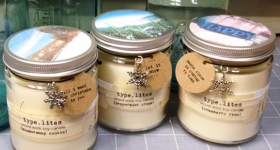Like dessert, few things satisfy the end of a museum visit like wandering into the museum store. It allows the visitor to linger in the experience a while longer and, perhaps, find a souvenir to take home.
At the Japanese American National Museum (JANM) in downtown Los Angeles, the experience is perfectly rounded out by the store — a circular space where, like a garden maze, you spiral in from the outer edges. In place of hedges are walls of thoughtfully chosen merchandise: shiso leaf seeds from Oakland, CA, and modern takes on traditional items, like a crocheted version of a kokeshi doll. No Monet mugs here.
This is all the more impressive given the added challenge that the Little Tokyo community posed when the current location opened in 1999. There was neighborhood concern that a museum store would compete with already existing stores in the community. “One of the agreements between the museum and the community was we wouldn’t sell a lot of ‘Japanese things,’ ” says Maria Kwong, director of retail and visitor services at the museum. She laughs. “So OK, can’t sell Japanese things, I can only sell Japanese American things. What are those things?”
In the store’s previous location, the stock was basic: books and videos about Japanese American history, logo merchandise. When Kwong joined the staff, she decided on a new approach. “I tried to look at the mission statement in a different way; I wanted to sell things that reflected the influence of the Japanese American community.”
For example, she reasons that without Japanese Americans, the rest of the country wouldn’t be eating sushi. So, in the store you will find sushi-print ties and erasers shaped like uni or maguro. There are also items indirectly reflective of their history, like kits for assembling a ukelele alongside kimono sewing patterns.
The store also develops its own products. When Kwong went through JANM’s collection for inspiration, she was drawn to a 55-gallon drum of Heart Mountain mystery rocks. The rocks, named after the Japanese American internment camp in Wyoming where they were discovered, are flat stones painted with the kanji characters for words like “strength,” “love,” “together.” Buried in the camp’s cemetery, the rocks were used to form sutras, or Buddhist scriptures used in Japanese funerals. Kwong found artisans to reproduce the rocks for retail, though staffers were skeptical. “Everybody thought, well who’s going to pay $9 for a rock? But we have sold thousands of them now. You sell not just the object, but also the story.”
A new product is a collection of museum teas blended by Chado Tea Room. After unsuccessfully trying to custom package its own tea for 10 years, the museum was approached by Chado, which had opened its third location at JANM. The partnership has worked out well. “Chado came up with the idea of using the Japanese tea as a base and then blending it,” Kwong says. “Then, it becomes more of a Japanese American hybrid product.” Called the “Generation Teas,” the five blends range from Issei to Gosei.
The most requested product? The 1976 made-for-TV production of Farewell to Manzanar, a memoir of a Japanese American family’s internment experience.
“Everyone has wanted to see it and now it’s a really historical piece of film,” Kwong says. “It was the first prime-time TV depiction of the whole story of incarceration.”
It took over a decade to find out why NBC Universal would not release it for redistribution: music rights. Now that they’ve finally received an answer, the museum is making efforts to re-edit the film with new music.
Along with the possible video project, the store has other products in development. Higashi Glaser Design, who created ZoLO, the successful line of visually modern children’s toys, is creating a custom frog character toy for the store. Why a frog? They’re an important part of Japanese culture and are even popular good luck charms for Las Vegas-bound Japanese Americans. And promisingly for the museum, the Japanese word for frog, kaeru, also means to return.
JANM's online store: www.janmstore.com
Gloria Kim is Hyphen’s Takeout Editor.









Comments